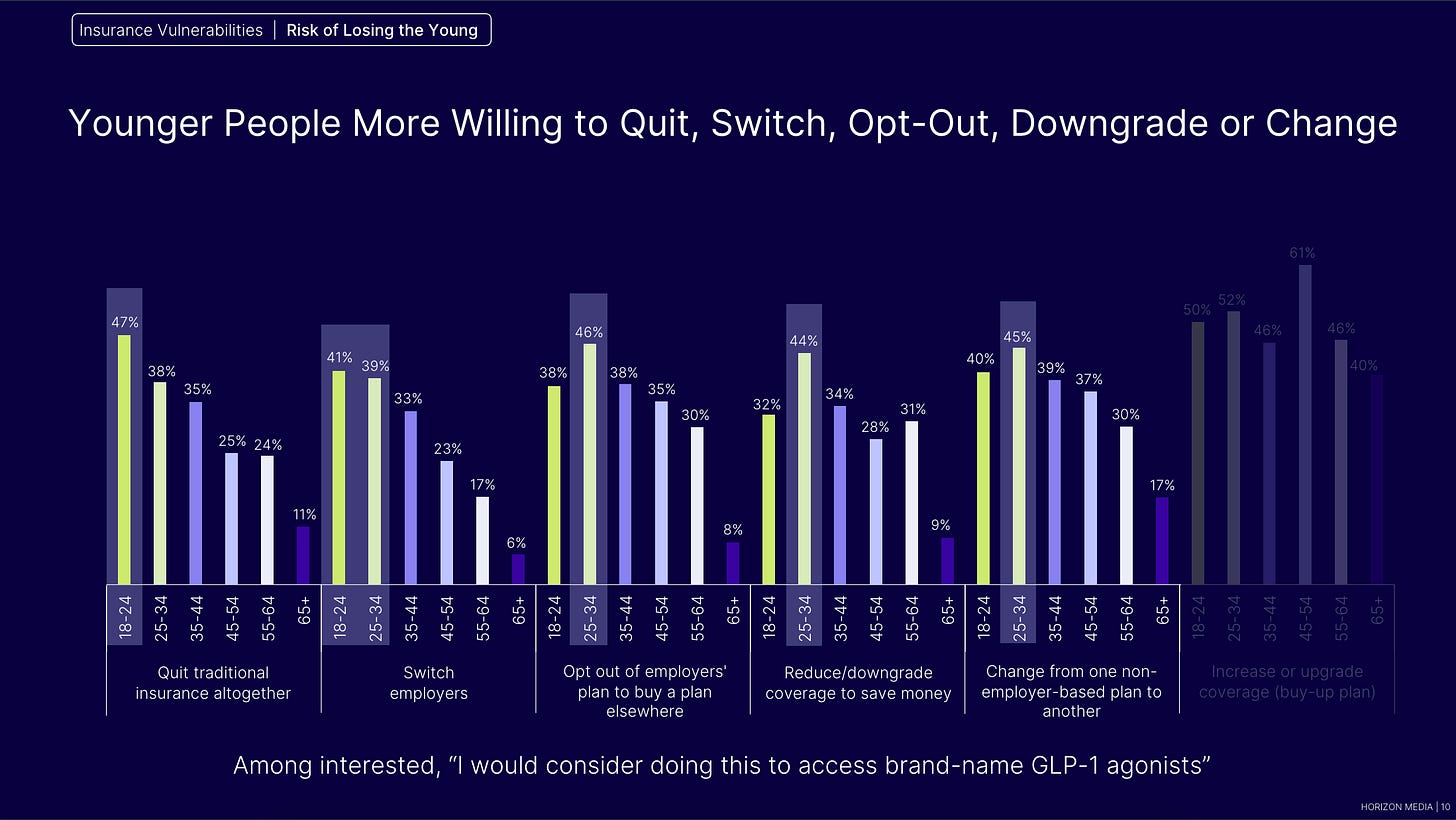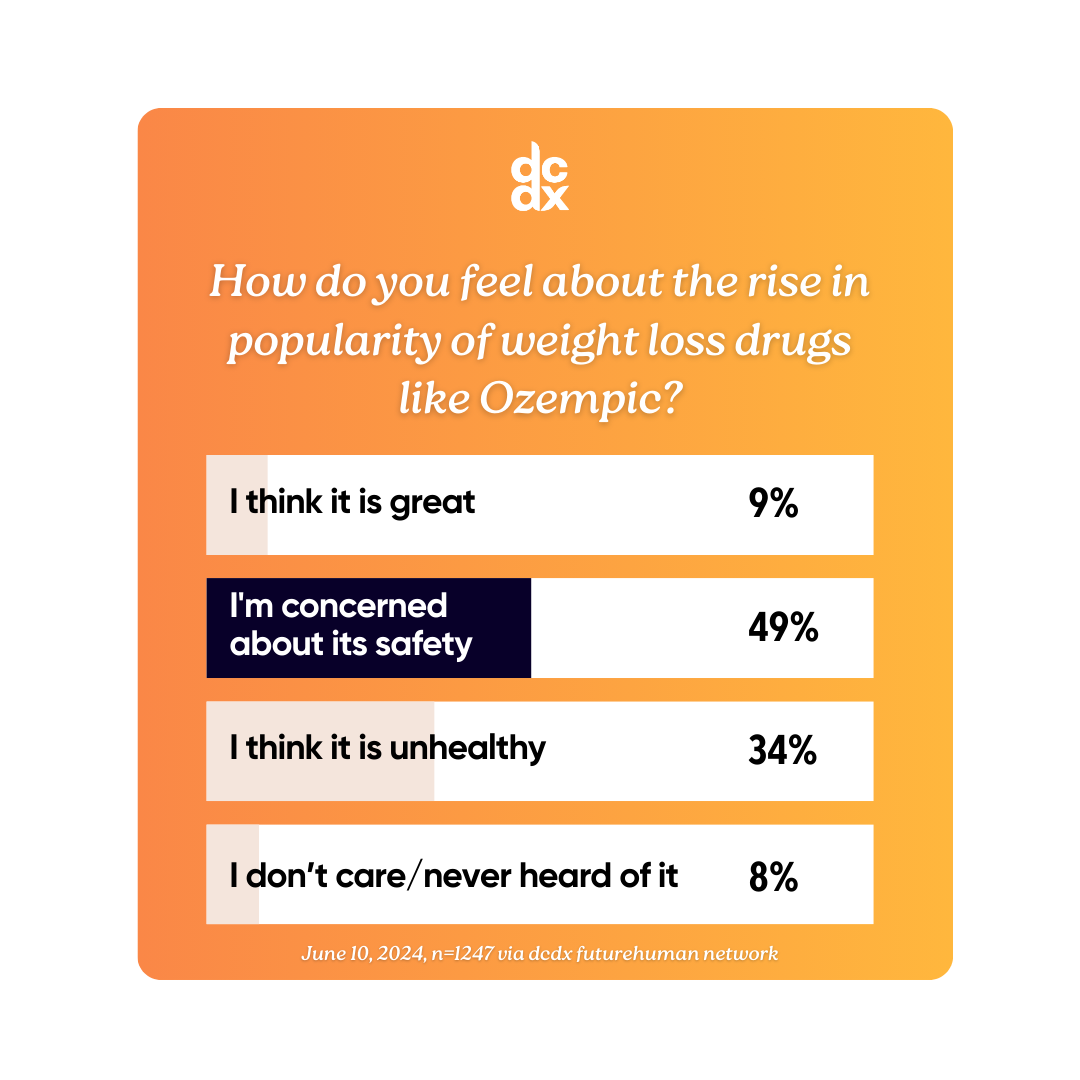💊 Gen Z's Problem with Ozempic
New research shows 83% of Gen Z have a negative perception of these weight-loss drugs - so why is usage surging?
After a solid first edition of 24/Z, we’re back by popular demand for more!!
This week on 24/Z we take a deep dive into how the surge of interest and use of popular weight loss drugs like Ozempic by young people is driving industry, cultural, and behavioral shifts.
📈 New Research
So, So Many Kids are Taking So, So Much Ozempic
The uptick in prescription weight loss drugs given to Gen Zers has seen a dramatic rise in the last 3 years
A new study published in the Journal of the American Medical Association reports that among people aged 12-25, there was an uptick of nearly 600 percent in prescriptions for GLP-1 agonists like Ozempic and Wegovy over the last three years.
Experts worry that this uptick could create an unhealthy association with how young people approach and conceptualize their struggles:
“If young people get the message 'your body is wrong and in order to fix it, here’s a pill,' it can set off a cascade of turning to quick fixes, low self-esteem, and negative body image that can take years to undo," dietician and wellness expert Lexy Penney told WebMD earlier this year.
How Ozempic and other weight loss drugs can upend health insurance marketing
These drugs are so popular and in high demand, that it is forcing an industry-wide shift: a new study from Horizon Media shows that these drugs are affecting the insurance industry:
Almost half (47%) of those 18-24 who are interested in these drugs say they'd consider leaving traditional insurance altogether for access to GLP-1s.
Teens Are Using 'Budget Ozempic' to Lose Weight
The other side of popular demand: some teens are starting to turn to “knock-off” pills, like laxatives or Zyns, to try and lose weight.
Almost 10% of teens have used unprescribed, potentially harmful products to try and lose weight, according to a new study.
Searches for laxative pills on Amazon have more than tripled in the past year, according to analytics company Pattern.
The Wall Street Journal noted that the hashtag #Guttok - which has amassed over 1 billion views - promotes quick weight loss hacks and fixed using budget laxatives. Our research below shows 10% of that coming in the last 90 days.
🧪 dcdx research on Gen Z’s perception of weight loss drugs
We polled Gen Z’ers from our network of 300,000+ to understand how they feel about the rise of drugs like Ozempic. As these drugs become more accessible to young people and embed their way into popular culture, it is crucial to understand how Gen Zers today feel about the normalization of these drugs in our culture.
Question: How do you feel about the rise in popularity of weight loss drugs like Ozempic? [Total Responses=1247] [June 10th, 2024]
I think it is great: 114 votes - 9.21%
I'm concerned about its safety: 603 votes - 48.71%
I think it is unhealthy: 423 votes - 34.18%
I don’t care/never heard of it: 98 votes - 7.92%
~50% of Gen Zers are concerned about the rise in popularity of these weight-loss drugs, and 83% of Gen Z have a negative perception of these weight-loss drugs.
The 9% of Gen Zers here who say they think drugs like Ozempic are great aligns with the 10% of young people who have used unprescribed weight loss products.
🧠 what we’re thinking…
It is not uncommon for Gen Z to say they believe one thing and then do another. We see this in the Paradox of Gen Z, when we look at Gen Z’s overwhelming favor to buy from fast fashion brands like SHEIN; an ongoing paradox between calls for sustainability and value-driven organizations, with near-obsessive consumption for their affordability and convenience.
The rise of usage of Ozempic - and its knock-offs - alongside the clear concern around its safety and healthiness shows the same paradox. Ozempic’s ease and convenience seem to outweigh the value of not only ‘doing the work’ or developing habits, but also loving yourself as you are - the signal of a cultural shift away from the body positivity movement.
When a generation (Gen Z & Alpha) grows up with such easy access to controlling these outcomes - it will almost certainly impact the value they place on the journey & habits often developed to get there.
🗃️ More on Gen Z and Ozempic
Food Marketing in the Ozempic Age - NY Times
“It’s an existential threat to the food industry and certainly an existential threat to the processed food industry,” said Marion Nestle, an emeritus professor of nutrition, food studies and public health at New York University who has written extensively on food policy and science. “You’ve got all these things coming together in a way they’ve never come together before.”
Erewhon Hauls, Ozempic, and Chefluencers
A deep dive into wellness cultures and Gen Z, including an exploration of how Ozempic deteriorated years of progress made by the body positivity movement.
The new fad among young consumers provides the cheapest route to appetite impression - the nicotine supplement Zyn.
Until next week - thank you for reading!







